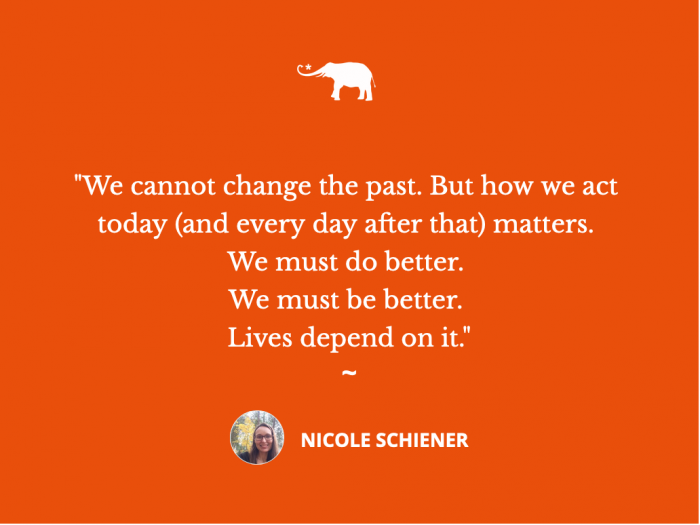I am a white woman.
I’m not an anti-racism educator; I’m a perfectly imperfect wife, mother, friend, psychotherapist, noticer, and writer who feels a responsibility to use my voice to invite us to do better in the wake of yet another tragedy and the exhaustion of the BIPOC community.
It was the brave sharing of personal stories by Indigenous medicine woman and Mentor Asha Frost and Black anti-racism educator Selam Debs and reading memoirs and podcasts by Black, Indigenous and Women of Colour (BIWOC) that opened my eyes and heart to how much pain and trauma racism causes.
Without their stories and the “Me and White Supremacy” challenge by Layla Saad, which is now a best selling book, I’m afraid I might not have noticed the examples of privilege I share below:
Last year, I felt the relief of my husband’s return from two weeks in isolation due to a COVID-19 outbreak. Although I was worried, I knew that he would have access to PPE to protect him and universal health care if he did get sick—because of his privilege. This was contrasted by the lack of access to resources resulting in the high numbers of deaths of Black and Indigenous people from the virus.
The joy of my little girl hugging her father upon his return was deeply contrasted by the heartbreaking image I saw of a little Black girl sobbing and clinging to her father as he shared about his experience of racial profiling and police brutality as a youth.
As a white mother, I have the privilege to choose whether I talk to my children about race. I know they will never feel invisible by society, and I have never had to think about coaching them on how to act to avoid being brutalized or killed by police, unlike Black parents who cannot afford not to.
The access to compassionate and advanced maternal health care that ensured my children’s safe arrivals is in sharp contrast to the high rates of Black maternal mortality due to racist policies and practices and the high numbers of forced sterilization of Indigenous mothers and foster placements of Indigenous children.
Despite last year’s public outcry against racism and the solidarity marches around the world, there is still so much work to be done.
Recently, my white husband was in a minor car accident. Luckily no one got hurt, and despite the circumstances, everyone was kind and understanding. This contrasted with the recent tragic outcome for a young Black man, Daunte Wright, at a traffic stop and the countless other examples of white men and youth treated with respect and dignity in comparison to the targeting, discrimination, and violence faced by BIPOC, Black men, and youth in particular.
When I take my children to the park, I don’t have to worry about racial slurs being thrown their way or being the victim of hate crimes, unlike moms I know with Asian children and children of color.
When I’ve shared what I’ve learned on my anti-racism journey over the last few years, I’ve received compassion and gratitude. But this is sharply contrasted by the almost daily occurrences of personal attacks, denial, unwanted advice, and white centering leading to exhausting emotional labor for the Black, Indigenous, and women of color I know when they share their lived experiences of racism, cultural appropriation, or their anger at injustices.
The more we open our eyes and hearts, the more we see and must acknowledge the privilege and prejudice that still exists—the violence and disparity that continues because of the ways we uphold white supremacy.
Imagine carrying the horrific memories of generational trauma in your cellular memory.
Imagine being constantly on guard and ever aware of the dangers lurking in public and online spaces.
Imagine not knowing who to trust.
Imagine trying to move forward despite all the ways society tries to hold you back to raise a family and fulfill your dreams.
Imagine the sense of betrayal when people who are supposed to be your friends turn against you.
We cannot change the past. But how we act today (and every day after that) matters. We must do better. We must be better. Lives depend on it.
Here is what we can do:
1. Instead of perpetuating the lie of white supremacy, can we be willing to reject it, acknowledge our privilege, and teach our children the truth? Rachel Cargle, Selam Debs, Krystle Cobran, Monique Melton, and so many more have anti-racism courses you can take.
2. Instead of centering ourselves, can we lean back and listen respectfully and empathically to BIPOC and honor the boundaries they set?
3. Instead of denying their reality of racism and discrimination, can we lean in and validate BIPOC’s lived experience and elevate their voices by sharing their stories?
4. Instead of getting defensive when triggered, can we go away and process our unhealed traumas and work through our shame?
5. Instead of opting out of anti-racism work for fear of getting called in or out, can we show up imperfectly and make a genuine apology when we make a mistake? Author of Native, Kaitlin Curtice recently shared on her Instagram “The Forgiveness Protocol” from Psychology Today to guide us on how to make a proper apology.
6. Instead of coming to the defense of white leaders who are called out, can we lean back and see how we can apply what BIPOC are saying to our own anti-racism journey?
7. Instead of only fighting for the rights of women who look like us, can we replace white feminism with a commitment to practicing Kimberly Crenshaw’s intersectional model of feminism and acknowledge and fight against the multiple oppressions that women of color and other marginalized women face?
8. Instead of appropriating sacred traditions and teachings, can we acknowledge and compensate BIPOC for their wisdom and medicines?
9. Instead of scrolling past or numbing when new tragedies occur, can we let ourselves grieve with our Black, Indigenous, and brothers and sisters of color and show our children this open expression of grief and outrage for another precious life lost or violated?
10. Instead of believing we are too small or don’t know enough or have enough to make a difference, can we let our grief spur us to fight against systemic racism and oppression?
Every bit counts: emails, phone calls, marching, challenging racist comments online or in-person, contributing to anti-racism and BIPOC mental health organizations.
Justice in June also has a list of action steps we can take.







Read 6 comments and reply